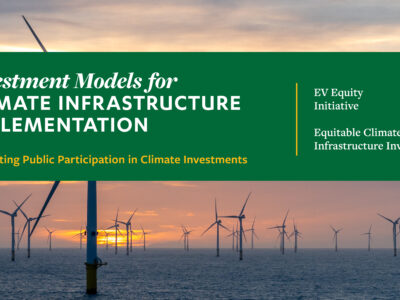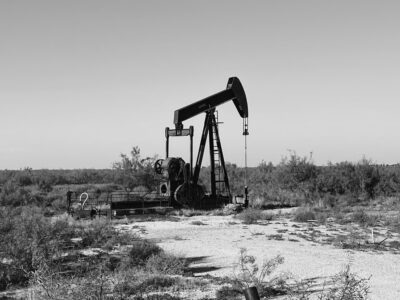Why Repeal the Endangerment Finding?
The aims may be overturning Mass v. EPA and avoiding new rulemakings.
Much will be said about the weakness of the various justifications EPA and the Department of Energy offered yesterday about why greenhouse gases do not endanger public health and welfare under the Clean Air Act. Those justifications are, indeed, remarkably weak. For example, DOE's argument that economic damages appear to be lower than economists estimate is a slap in the face to the families of the more than 130 people who died in last month's horrific, 1000-year flo...
CONTINUE READINGStates Become “Norm Sustainers” on Environmental Justice
Guest Contributor Sharmila L. Murthy explains how state Attorneys General are acting as important counterweights to the federal government on environmental justice.
Guest contributor Sharmila L. Murthy is a Professor of Law and Public Policy at Northeastern University In the wake of misleading and inaccurate characterizations by the Trump Administration that wrongly label environmental justice activities as illegal discrimination, the Attorneys General of California, Massachusetts, and New York, joined by the Attorneys General of Arizona, Connecticut, Delaware, Hawaii, Illinois, Maryland, Minnesota, Oregon, Rhod...
CONTINUE READINGWorld’s Biggest Court Opinion on Climate
The Drain is a weekly roundup of environmental and climate news from Legal Planet.
For more than 24 hours last week, my social media feeds were a wall of jubilant reaction to the World Court’s big climate opinion. People who work on, and care about, the climate crisis needed some good news, clearly. That begs the question, is the advisory opinion really as big a deal as people wanted to believe? “Without a doubt. It is a huge step forward," UCLA Law Professor Kate Mackintosh told me in an email. Mackintosh is the Executive Director of the UC...
CONTINUE READINGDoes Federal Law Still Preempt State Standards Relating to Fuel Efficiency?
The answer may depend on what being “in effect” means.
If a tree falls in the forest but no one hears it, does it still make a sound? If a law hasn’t been formally repealed but can be violated with complete impunity, is it still in effect? I'll leave the first question to philosophers, but the second one could have major legal implications. Here's why. For decades, the government has set fuel efficiency standards for new vehicles. But in the big reconciliation bill it recently passed, Congress decided to embrace gas...
CONTINUE READINGAnother Attempt to Measure NEPA’s Impact
This most recent report is better, but still has significant flaws
The Breakthrough Institute has produced another report on litigation under the National Environmental Policy Act (NEPA), building on a report it prepared earlier, which I sharply criticized in this prior blog post. The updated report is a mixed bag: It doesn’t solve many of the methodological issues I identified in the earlier blogpost; it does do more to forthrightly acknowledge some of those limitations; but then it proceeds to make sweeping statements in its concl...
CONTINUE READINGThe Unitary Executive Theory As Government-Smasher
The Supreme Court's Imperial Presidency drive isn't formalism: it is calculated to destroy the state.
It is a misnomer to discuss the current Supreme Court’s “jurisprudence” on anything, as if it has an approach to any legal question other than, “because we said so, libtard.” But in the wake of the Court’s lawless and arbitrary use of the shadow docket to destroy statutes and precedents for the purpose of giving Donald Trump greater power – and not even bothering to explain why – something did occur to me. To the extent that there is any jurisp...
CONTINUE READING“A Historic Day”: the World Court’s Big Climate Opinion
UCLA Law’s Anna Spain Bradley offers takeaways from the International Court of Justice’s Advisory Opinion on the Obligations of States in Respect of Climate Change.
It’s been a long time coming but nations of the world officially have a legal obligation to limit their emissions of greenhouse gases or else pay reparations for the harms of climate change. That was the unanimous opinion handed down yesterday by the 14 judges on the International Court of Justice, sometimes called the World Court. The Advisory Opinion, though technically non-binding, affirms the existence of a legal right to a “clean, healthy and sustainable env...
CONTINUE READINGInvestment Models for Climate Infrastructure Implementation
Exploring avenues for implementing publicly-supported climate solutions.
This month’s federal budget and policy legislation rescinded billions of dollars in clean energy and climate-related infrastructure investments and halted the progress of many projects already underway, including major tax incentive and grant programs focused on wind and solar energy, vehicle electrification, and domestic manufacturing. A subsequent executive order further cemented the federal government’s shift away from supporting climate-related investments. ...
CONTINUE READINGGlobal Energy Trends
Trump or no Trump, the global economy is shifting toward clean energy.
The International Energy Agency’s 2025 review isn’t likely to make the bestseller list. But there’s some eye-opening information. We can lose sight of global trends because of our understandable preoccupation with our own situation. Not that U.S. trends are unimportant, mind you, but they’re not the whole ball game. The big takeaway globally is that oil and coal are basically static, and natural gas is growing slowly. Meanwhile alternate forms of energy are boo...
CONTINUE READINGNewsom Proposes More Oil Drilling In CA
The State Should Get Far More Benefit
Last Thursday, the Newsom Administration proposed a new law allowing extensive additional oil drilling in California, as long as the new wells are in existing oil fields and the oil company closes one well in the oil field for each one drilled and one in health a safety designated areas. The proposal appears to be in response to threatened oil refinery closures in the state. In my view, there are other ways to respond to threatened refinery closures, but, having spen...
CONTINUE READING











